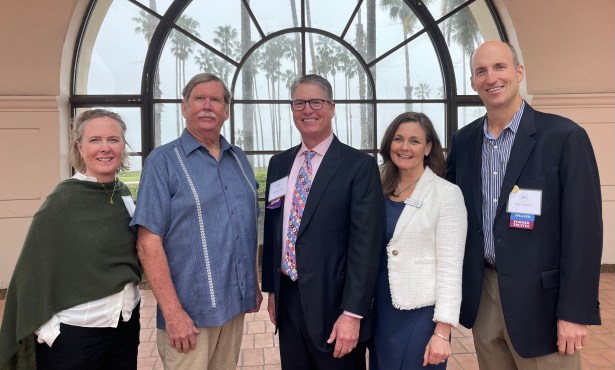A NEXUS of troubles
The Battle Between UCSB Student Government and the Daily
Nexus
by Drew Mackie • Photographs by
Paul Wellman
 When members of the UCSB Associated
When members of the UCSB Associated
Students Legislative Council voted at a January 17 meeting to
freeze funding to the school’s student-run newspaper, the Daily
Nexus, one had to wonder if they and the handful of Nexus staff
members present realized how accurately they were reenacting a
performance of the tensions that have plagued the two entities for
the past 30 years.
Leading up to that vote, the traditional scripts were read:
Legislative Council members accused the paper of bias and racial
insensitivity, and Nexus representatives countered that student
government was trying to quash its freedom of speech. Despite
periods of more amiable interaction, these very charges have been
lobbed back and forth since UCSB’s official campus newspaper began
running under the Daily Nexus banner in 1970. For those who have
followed the history of the fight — as this reporter has, a former
employee with the Nexus — this incident stands apart from the
previous run-ins. This time, Leg Council members claim the Nexus
has so transgressed the collective mores of the school that it
deserves to lose a portion of its funding for the rest of the
academic quarter. The newspaper’s perceived crime is that it
accepted advertising money from Conquest Student Housing, the
company that evicted residents of Isla Vista’s Cedarwood Apartments
last fall. “What the Nexus did is wrong. I’m not in favor of anyone
profiting off these evictions,” said Council Off-Campus
Representative Jeronimo Saldana, referring to Conquest Student
Housing’s full-page advertisements in the Nexus.
Following the Cedarwood evictions, many UCSB students protested
what they perceived to be unfair treatment of the complex’s
residents, many of whom were Latino. In late 2006, the Leg Council
approved a boycott of the company. Saldana and other council
members say that because the Nexus receives funding through the
council, running the ads violated the boycott. Furthermore, to hear
council members tell it, the Conquest ad represented an ethical
disconnect between the Nexus and the student body. Some Legislative
Council members claimed the paper’s editorial content also
reflected a racist bias. The extent of the council’s frustration
was exemplified by Saldana’s request that he not be photographed by
a Nexus photographer during the meeting. “I don’t want my name in
[the paper],” he explained. “I, as an angry person of color, don’t
want to be associated with it. … I don’t even read the Nexus
anymore.” Daily Nexus Editor-in-Chief Kaitlin Pike later responded
to the objection to the Conquest ad by explaining that the Nexus
observes the traditional separation between the editorial and
advertising offices.
 At the meeting’s end, the council voted
At the meeting’s end, the council voted
13-5 in favor of an impassioned resolution written by Saldana to
end the paper’s cash flow from the Associated Students, despite the
fact that the council’s acting executive director, Marilyn Dukes,
advised the student government group that she had not determined
whether revoking funds would violate the First Amendment.
Pike said the money constituted about seven percent of the
paper’s annual income. She believes the Associated Students (AS)
Legal Code prohibits the student government from restricting the
money, as the paper is not technically a Legislative
Council-affiliated organization. She said the money in question — a
lock-in fee of 85 cents per student per quarter and 57 cents per
student during summer sessions — is collected and disbursed, but
not controlled, by the council. According to Pike, since UCSB
students voted to pay this fee in an on-campus election, the
funding can only be eliminated through another vote by the student
body. “I don’t want a lawsuit,” Pike said in an interview following
the meeting. “That would be expensive for the students. But I’m
willing to fight for this.”
On the Friday following the meeting, however, Legislative
Council President Jared Goldschen vetoed the resolution on the
grounds that such measures could be illegal and unconstitutional.
He also had concerns about punishing the Nexus monetarily, given
that UCSB’s most recent audit of the Nexus showed it was more than
$600,000 in debt. “I veto this bill not to downplay the level of
responsibility and accountability we should hold the Nexus to, but
to ensure that Legislative Council is acting in accordance with the
law and respects the due process,” Goldschen explained in a written
statement.
While Saldana and other Nexus critics look into what retributive
measures the AS Legal Code allows them, the apparent death of this
attempt to revoke funding does not quiet UCSB’s debate over
journalistic integrity. At the same meeting that approved Saldana’s
resolution, Legislative Council members outlined their view of the
paper’s failings, including the fact that the university has little
oversight into how the paper is run and that staff receives no
formal training.
Council members also read aloud some of the paper’s content,
including an item from the “Weatherhuman” — a humor column that
appears beneath the Daily Nexus masthead — in which Leg Council
members were derided as “whiny little bitches.” The
“Weatherhuman” — which is written anonymously, usually by a staff
member — was the subject of controversy a year ago when an item
appearing in the first issue after Martin Luther King Day bore the
headline “King of Spades.” Pike explained that when editorial staff
learned that “spade” was a derogatory term for an African-American,
the editor who had written the item was immediately fired. “How can
you read something like that and think it’s morally correct?” asked
On-Campus Representative Scarlet Chan, who burst into tears during
the meeting.
Pike was quick to point out that the paper’s opinion page served
as a forum for free speech, and that all viewpoints were published.
“It’s your student newspaper,” she said. “If you want to change it,
you need to be the change you want to see.” She then encouraged her
critics to write in response to articles they found offensive or
incorrect.
HISTORY REPEATS ITSELF
Daily Nexus staffers are well versed in such debate. While
acclaimed in some circles, the Nexus has frequently butted heads
with the AS Leg Council and UCSB’s various minority groups,
sometimes simultaneously. The first notable instance of this was
the Nexus’s attempt to free itself from the economic control of the
council, which has previously held more sway over the publication’s
finances. After changing its name from El Gaucho, the Nexus
introduced a ballot measure in the 1974 on-campus election that
awarded it the very lock-in fee the current Legislative > >
> Council voted to restrict from the paper. Ironically, the
measure was designed to protect Nexus funds — and therefore
content — from being manipulated by student government, a frequent
target of the paper’s criticism.
The following year, Jim Minnow narrowly won the position of
editor-in-chief over Murvin Glass, who then became president of
UCSB’s Black Student Union and a candidate for AS president. When
the Nexus printed an editorial cartoon depicting Glass stealing
copies of the paper, Glass successfully sued both Minnow and the
Nexus. According to a history of the Nexus compiled by staff
members, the paper investigated claims into financial
misappropriation by the 1984 AS president, which ultimately ended
in his resignation. And in 1986, the Nexus responded to more
protests with an apology for failing to mention Ronald McNair — the
only African-American astronaut on the Challenger — from an article
discussing the disaster.
The Nexus faced charges of racism again in 1990, when a story on
a confrontation between police officers and African-American
students referred to the incident as a “race riot.” In 1994, staff
turmoil ended in the resignation of the paper’s first Filipina
editor-in-chief, sparking claims by the Leg Council and other
campus groups that her ethnicity played a notable role in the
premature end of her tenure. In 1997, Nexus staff threatened legal
action against the AS president, whom they believed stole copies of
the paper featuring editorials critical of a student government
project. And in late 1998, Asian students protested against the
Nexus after it ran a story that suggested Vietnamese immigrants
were responsible for disappearing dogs in Isla Vista.
Cervin Morris, who served as AS president during the 2004-2005
school year, recently claimed the Nexus unfairly targeted him
because he’s African-American. After he was charged with assault
during his presidency, Morris claimed the Nexus hounded him,
publishing articles about every step in the legal ordeal that
ensued. “Every time something would happen, they’d put the whole
story in the paper again,” Morris said. He pointed out that only
one article was written about AS Vice President Adam Graff’s public
intoxication arrest in 2006.
Morris also added his voice to those criticizing the Nexus for
running two front-page photographs illustrating the arrests of
former UCSB student Ricardo King, one for allegedly shoplifting and
another in connection with attempted rape charges. The protesters
argued that repeatedly running photos of an African-American man
being arrested depicted African-American students in a negative
light. According to Morris, the paper seeks attention through
sensationalist reporting. “I think it’s something that gets people
to read the newspaper — scandal and taboo… . People will pick it up
to see what’s going on,” he said. “It’s the Nexus trying to get in
the middle of conflict.”
BLAME GAME
Due to the frequency of such clashes, virtually every UCSB
employee who has worked for the Nexus, with the AS Leg Council, or
a minority interest group has an opinion on what causes the cycle.
For Brendan Buhler, who served as editor-in-chief for an
unprecedented two years, from 2002-2004, the criticisms from
minority groups and Leg Council are linked because student
organizations tend to dominate the council and AS elections have
consistently low voter turnout. “You’d only need about 200 people
or so to get elected,” he said. Buhler characterized AS members as
“hypersensitive” and argued that charges of racism are levied
against the paper again and again due to the memory of past
controversies rather than real grievances.
Aaron Jones — a UCSB alum who now serves as the council’s
Student Government Advisor — likens the conflict to the Hatfields
and McCoys. Though he admits that animosity between the two
entities has always existed, he lays the much of the blame for its
continuance on the Nexus. “I don’t get the sense that the Nexus
staff gets much training,” Jones said. “Maybe the publications
director can help improve the paper and help it branch out to more
facets of the community. Maybe then [minority groups] will feel
welcome at their school paper.”
The position Jones mentioned was vacated when Tybie Kirtman
retired in September 2006 after working for the paper for 13 years.
In Kirtman’s view, the Nexus’s freedom from the university is a
virtue, not a liability. “I always told the editors [that] the
chancellor may be the most powerful individual, but the Nexus is
the most powerful entity,” Kirtman said. “And they learned how to
do it on their own. And I think they did a remarkable job with it.”
Kirtman blames the controversy on the fact that both the paper’s
staff and the student government turn over every four years, making
learning from past mistakes difficult. “There’s no history there.
Nobody remembers,” she said.
Brandon Brod, who until 2005 served as UCSB’s conduct educator
and hate crime response coordinator, called the charges of racism
against the Nexus “total bullshit.” “When people use [the term]
‘hate speech,’ they’re saying that they read something that made
them sad,” said Brod, who has left academia. He claimed that the
frequency of racism charges against the Nexus stem from a leftist
academic atmosphere that leaves no room for dissenting viewpoints.
“My experience at UCSB nearly made me turn Republican — and I’m
saying that as an openly gay man,” Brod joked.
OLD HABITS DIE HARD
Regardless of their opinions on the nuances of the AS
Legislative Council-Daily Nexus conflict, most authorities agree
the strife could be tempered by improved communication. Fund for
Santa Barbara Executive Director Geoff Green credits his positive
rapport with the Nexus during his 1993-1994 tenure as AS president
to a healthy, mutual understanding between the two groups about
their respective goals. To further this effort, Green started “A.S.
As It Is,” a weekly opinion column that shared elected officials’
thoughts with Nexus readers.
But Kerri Webb — who served as the paper’s first
African-American editor-in-chief from 1998-1999 — believes the
chances of ending the feud altogether are slim. “The Daily Nexus
and Associated Students have always had a love-hate relationship,”
Webb said. “If the Nexus gets away from its mission of serving the
students and reporting the news, then they need to take a step
back.” Recalling her days heading the paper, Webb also admits that
the sparring relationship between the two groups — not uncommon
between government agencies and the journalists who report about
them — did have its advantages. “It made the job a little more
interesting,” she said.
Pike said she is ready to move past this most recent conflict
and begin looking ahead to other projects she’d like to complete
during her year in charge of the paper. “I just see it as one more
bitter spat between the Nexus and AS. I would like to move beyond
this,” she said, adding that she’d be happy to entertain the
concerns of the Nexus’s critics in person.
For Saldana, the Conquest Student Housing advertisements are not
so easily forgotten. Convinced of his resolution’s legality, he and
other AS members will consider overturning the president’s veto at
next week’s council meeting. “We’d need a majority vote, and I
think we can do it,” he said.



